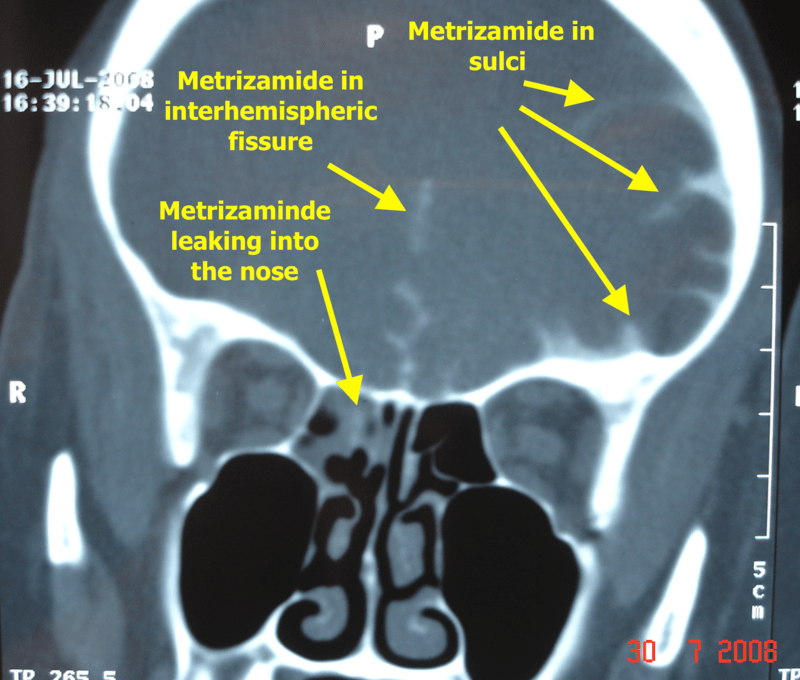The key difference between runny nose and CSF leak is that runny nose is a medical condition that occurs when mucus is being discharged out of the nose due to colder outer temperatures, flu, or allergies, while CSF leak is a medical condition that occurs when cerebrospinal fluid leaks from a hole in the outermost layer in the meninges (dura) and out through the nose or ear.
Rhinorrhea is a condition that causes the free discharge of thin nasal mucus fluid. Rhinorrhea can occur due to many reasons like cold temperatures, inflammatory (infections, allergies, and crying), non-inflammatory (head trauma), and other causes such as opioid withdrawal. Runny nose and CSF leak are two medical conditions that cause rhinorrhea.
CONTENTS
1. Overview and Key Difference
2. What is Runny Nose
3. What is CSF Leak
4. Similarities – Runny Nose and CSF Leak
5. Runny Nose vs CSF Leak in Tabular Form
6. Summary – Runny Nose and CSF Leak
What is Runny Nose?
A runny nose is a medical condition that occurs when mucus is being discharged out of the nose due to colder outer temperatures, flu, or allergies. A runny nose can occur due to anything that irritates or inflames the nasal tissues. Therefore, infections such as the common cold by influenza, allergies, and various irritants can cause a runny nose condition. Sometimes, people have a chronic runny cause condition for no apparent reason. This is called nonallergic rhinitis and vasomotor rhinitis. Moreover, less commonly, a runny nose can also be caused due to polyps, a foreign body, a tumor, or a migraine.

Figure 01: Runny Nose
A runny nose condition may accompany symptoms such as cough, shortness of breath, fever, chills, fatigue, loss of smell, body aches, sore throat, diarrhea, postnasal drip, ear infection, nausea, and vomiting. A runny nose can be diagnosed through physical examination, clinical presentation, and viral isolations. Treatments may include antibiotics, decongestants, drinking plenty of fluid, resting, saline nasal spray, cool-mist humidifier at bedsides, antihistamines, and home remedies such as essential oils, drinking hot teas, facial steam, hot shower, spicy foods, etc.
What is CSF Leak?
CSF leak is a medical condition that occurs when cerebrospinal fluid leaks from a hole in the outermost layer in the meninges (dura) and out through the nose or ear. The hole or tear in the dura can be a result of a head injury and brain or sinus surgery. Moreover, CSF leaks can also occur after a lumbar puncture. Sometimes, spontaneous CSF leaks occur for no known reason.

Figure 02: CSF Leak
The CSF leaks may cause symptoms such as headache, nasal drainage, meningitis, visual disturbances, and tinnitus. CSF leak can be diagnosed through analysis of nasal fluid for beta -2 transferrin protein, CT scan, MRI scan, coronal CT cisternogram, pledget study, myelography, and spinal tap. Treatments for CSF leak may include epidural blood patch, sealant, surgery, transvenous embolization, bed rest, elevating the head of the bed, taking stool softeners to prevent straining.
What are the Similarities Between Runny Nose and CSF Leak?
- Runny nose and CSF leak are two medical conditions that cause rhinorrhea.
- Both medical conditions cause fluid discharge from the nose.
- These medical conditions can occur for no known reason.
- They are treatable medical conditions.
What is the Difference Between Runny Nose and CSF Leak?
A runny nose is a medical condition that occurs when mucus is being discharged out of the nose due to colder outer temperatures, flu, or allergies, while CSF leak is a medical condition that occurs when cerebrospinal fluid leaks from a hole in the outermost layer in the meninges (dura) and out through the nose or ear. Thus, this is the key difference between runny nose and CSF leak. Furthermore, a runny nose can occur due to infections by viruses such as influenza. On the other hand, CSF leak can occur due to injury, brain or sinus surgery, and after lumbar puncture.
The below infographic presents the differences between runny nose and CSF leak in tabular form for side by side comparison.
Summary – Runny Nose vs CSF Leak
Runny nose and CSF leak are two medical conditions that cause rhinorrhea. Runny nose occurs when mucus is being discharged out of the nose due to colder outer temperatures, flu, or allergies while CSF leak occurs when cerebrospinal fluid leaks from a hole in the outermost layer in the meninges (dura) and out through the nose or ear. So, this is the key difference between runny nose and CSF leak.
Reference:
1.Kieffer, Sara. “Cerebrospinal Fluid (CSF) Leak: Johns Hopkins Skull Base Tumor Center.” Cerebrospinal Fluid (CSF) Leak: Johns Hopkins Skull Base Tumor Center.
2.“Runny Nose: Symptoms, Causes & Treatment.” Cleveland Clinic.
Image Courtesy:
1. “A man sprays medicine in his nose. Runny nose treatment concept” By Marco Verch Professional Photography (CC BY 2.0) via Flickr
2. “Metrizamide high resolution CT showing leak of CSF into nasal cavity” By Walid Maani – Own work (CC BY-SA 4.0) via Commons Wikimedia
ncG1vNJzZmivp6x7pbXFn5yrnZ6YsqOx07CcnqZemLyue9ahmK1lmah6tbTEZpuinpaav6a6wp5km52krLKmuoyrrKemqWK7sL%2FEZpinnF2YwKd5y56YpGc%3D